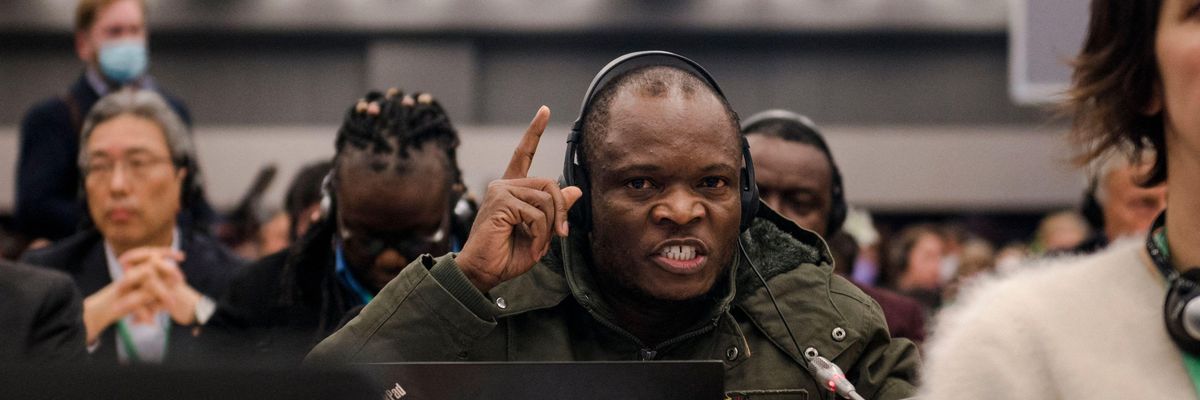Over the objections of the Democratic Republic of Congo and frustrations by other African nations, a final draft of The Kunming-Montreal Global Biodiversity Framework was adopted in the early hours of Monday that conservationists say is not strong enough to prevent industries and corporate behemoths from continuing their destructive, profit-driven attacks on the natural world and vulnerable species.
"The draft agreement is weak," said An Lambrechts, leader of Greenpeace International's delegation at the summit, following the release of the final draft text on Sunday. "This is an open invitation to greenwash. In its present shape, it won't halt biodiversity loss, much less reverse it."
"Taken altogether... COP15 failed to deliver the ambition, tools, or finance necessary to stop mass extinction."
Some NGOs praised the deal as a historic achievement that followed years of negotiations at the international level under the Convention of the Parties process and Inger Anderson, Under-Secretary-General of the United Nations and Executive Director of the UN Environment Programme, said the "adoption of this Framework and the associated package of ambitious targets, goals and financing represents but a first step in resetting our relationship with the natural world."
The key agreement under the Global Biodiversity Framework (GBF) is the goal of protecting 30 percent of all land and water vital to species and ecosystems by the year 2030. This compares to the current situation in which less than 17% of land and just 10% percent of marine environments are under formal protections.
"Make no mistake: this is an historic result for nature," said Andrew Deutz, director of global policy for The Nature Conservancy, in a statement. "The Kunming-Montreal Global Biodiversity Framework provides a long-needed international blueprint to guide our collective turnaround of nature's fortunes within this crucial decade."
But the approval of the deal was not without controversy.
A row ensued during final deliberations when the Democratic Republic of Congo delegation raised concerns that the agreement did not ask enough of wealthier, more developed nations to fund the conservation goals set out in the framework.
"The parties which are developed nations should provide resources to parties which are developing," a Congolese representative said through an interpreter.
Climate Change News reports that both the Ugandan and Cameroon delegations were displeased with how Chinese minister of ecology and environment Huang Runqiu, who chaired the conference, brought down the gavel and declared the agreement approved despite what was a clear objection from the DRC.
"What we saw was a force of hand," said one delegate from Cameroon via a translator while Uganda asked to have its displeasure over the process put on the official record.
Anderson said that the success of the pact "will be measured by our rapid and consistent progress in implementing, what we have agreed to," adding that the "entire United Nations System is geared to support its implementation so that we can truly make peace with nature."
But while many expressed optimism that the Kunming-Montreal framework represents the beginning of a new era to protect the world's biodiversity, more critical conservationists like Greenpeace and Friends of the Earth International (FOEI) said people should not be fooled about what the deal contains and what it lacks.
FOEI said it was "deeply concerned" about the way in which the framework was adopted and warned that "the corporate capture of the Convention on Biological Diversity (CBD) made reaching the kind of deal the crisis demands impossible.
"The text does not stipulate any regulation on corporations and instead promotes greenwashing measures such as 'Nature-Based Solutions,' which allow for offsetting for environmental destruction," said Nele Marien, FOEI's forests and biodiversity coordinator, in a statement on Monday.
The approved draft, said the group, "does not stop the destructive advance of agribusiness, the main driver of biodiversity loss. Rather, it promotes agribusiness through concepts such as 'sustainable intensification' and 'innovation.'"
And while Greenpeace applauded the "explicit recognition" in the agreement that the rights, roles, territories, and knowledge of Indigenous Peoples are key to protecting biodiversity worldwide, the group said the pact still fell short on this front.
"Indigenous Peoples are the most capable and knowledgeable guardians of nature," Lambrechts said. "There is so much potential for biodiversity protection if Indigenous Peoples are in leadership roles. Rights-based protections are the future of conservation. Direct finance for Indigenous Peoples is a critical next step."
"Taken altogether, however, COP15 failed to deliver the ambition, tools, or finance necessary to stop mass extinction," she added. "The 30x30 target, to protect at least 30% of land and of sea by 2030, has successfully made it in. But it is stripped-down, without essential qualifiers that exclude damaging activities from protected areas. As is, it is just an empty number, with protections on paper but nowhere else."




